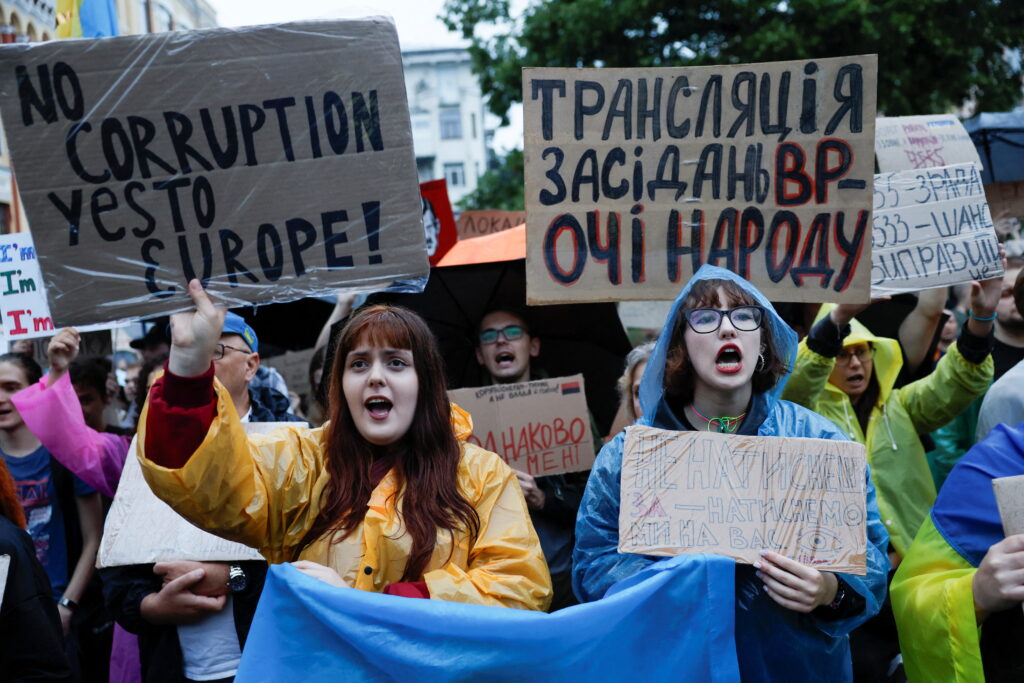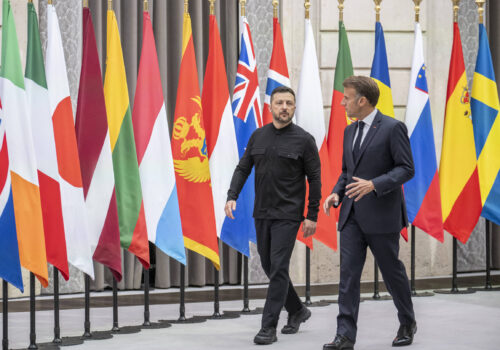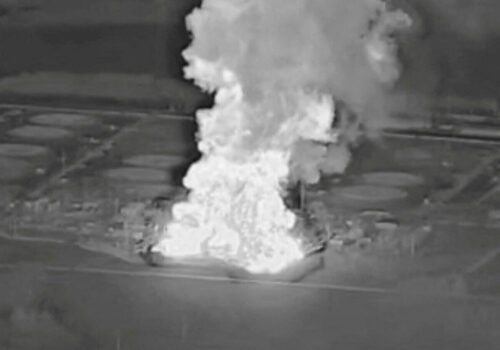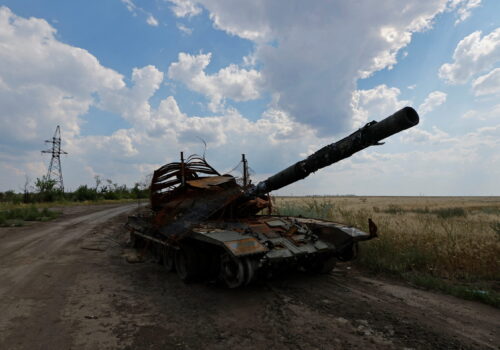In recent months, Russian President Vladimir Putin has responded to US-led peace efforts by escalating attacks on Ukrainian civilians and seeking to undermine the legitimacy of the Ukrainian government. The Russian ruler refuses to even meet Ukrainian President Volodymyr Zelenskyy for talks, attempting instead to portray him as the illegitimate leader of an irredeemably corrupt government. Moscow’s goal is to delay meaningful negotiations and weaken Western resolve to support Ukraine in the hope that this will cause the Zelenskyy government to fall and derail the entire Ukrainian war effort.
Putin’s uncompromising stance reflects his commitment to extinguishing the threat posed by a free and democratic Ukraine. The Russian leader was driven to invade primarily because he saw an independent Ukraine slowly but steadily building the institutions of a functioning democracy right on Russia’s border. This represented an existential challenge to Putin’s own regime, an autocracy fueled by systemic corruption and dependent on repression.
Faced with Russia’s determination to destroy Ukraine as a state and as a nation, Ukrainians could be tempted to delay the fight against corruption at home in order to first defeat Russia. In reality, however, this is a false choice. Ukraine has been locked in a struggle against both Russian imperial aggression and domestic corruption for more than a decade. From the 2014 Revolution of Dignity to the full-scale Russian invasion of 2022, Ukrainians have been battling not only to defend their land, but to build a country that belongs to its citizens rather than oligarchs and autocrats. The fight against Russia and the fight against corruption are two fronts of the same war.
Stay updated
As the world watches the Russian invasion of Ukraine unfold, UkraineAlert delivers the best Atlantic Council expert insight and analysis on Ukraine twice a week directly to your inbox.
Recent events in Ukraine underscore just how wrong Putin is to question the nation’s fundamental commitment to democracy. Over several days in July, thousands of Ukrainians took to the streets in cities across the country, braving the threat of Russian missiles and drones to demonstrate against their leaders. They were not protesting wartime hardships or economic woes, though both are deeply felt. These protests were driven by a more fundamental desire to safeguard the country’s anti-corruption institutions against efforts to turn back the clock and undo the progress achieved since the Revolution of Dignity.
These recent protests were sparked by a government move to strip Ukraine’s anti-corruption agencies of their independence. The Ukrainian authorities may have been attempting to use wartime exigencies to bring anti-corruption bodies under their control and prevent the possible prosecution of high-level officials. If so, this was a major miscalculation. Within hours of a parliamentary vote placing key anti-corruption institutions under the authority of the prosecutor general, Ukraine’s first major protests since the start of Russia’s full-scale invasion were underway.
International stakeholders including the European Union, the International Monetary Fund, and Ukraine’s G7 partners also reacted swiftly. The EU publicly demanded the full reversal of the legislative changes, stressing that independent anti-corruption institutions are a prerequisite for Ukraine’s EU accession. To exert concrete pressure, Brussels suspended €1.5 billion in macro-financial assistance that was already in the pipeline for Ukraine.
The IMF echoed these concerns, indicating that Ukraine’s compliance with anti-corruption commitments was essential for ongoing financial support. Similarly, G7 officials issued a statement urging the Ukrainian authorities to protect the autonomy of anti-corruption bodies, warning that continued support from international partners depended on upholding the rule of law.
Bolstered by this international support, Ukraine’s civil society won the day. Zelenskyy moved quickly to reverse course, proposing new legislation that reinstated the independence of Ukraine’s anti-corruption agencies. The lesson was clear: There can be no trade-offs for Ukraine when it comes to combating corruption, just as there is no room for half measures in the fight against Russia.
Eurasia Center events

Ukraine’s July 2025 protests reaffirmed a commitment to grassroots democracy that has defined the country’s post-Soviet experience. During the Revolution of Dignity, millions of Ukrainians rallied not merely to remove an unpopular president who was viewed as a surrogate of Russia, but to demand a system of government where institutions work for the public good rather than the benefit of the few. This has served as a vision for the country’s future ever since. Even now, amid the largest European invasion since World War II, Ukrainians continue to demand accountability while working to create a truly democratic society rooted in the rule of law.
Ukraine’s courage, ingenuity, and resolve in the war against Russia draw heavily from the sense of empowerment that sprang from landmark events like the Revolution of Dignity and subsequent democratic reforms such as the decentralization of power. This has helped give Ukrainians more confidence in their ability to shape their communities and their country, fostering solidarity and promoting engagement in public life.
Greater Ukrainian agency has translated into remarkable resilience on the battlefield and beyond. Local initiatives, volunteer networks, and territorial defense units have all thrived because the Ukrainian authorities ceded space for society to organize itself. When power flows from the ground up, a nation becomes so much more than the territory it defends. This has helped make Ukraine capable of fighting back against a far larger adversary.
Ukrainian society’s lack of tolerance for corruption is perhaps nowhere more evident than in the defense sector, where the stakes could not be higher. As Ukraine fights for its very existence, citizens and soldiers alike have demonstrated zero patience for anyone accused of exploiting the war for private gain. Wartime corruption scandals related to military procurement have provoked widespread outrage across the country. The public response has often been swift and unrelenting with investigations launched, resignations demanded, and reforms accelerated.
Despite the success of this summer’s protest movement, the battle to protect Ukraine’s anti-corruption architecture is far from over. As Ukraine moves forward, its commitment to safeguarding the autonomy and integrity of anti-corruption organs will be tested by adversaries who are as persistent as they are resourceful. In parallel to the ongoing Russian invasion, Moscow will continue to push the message that Zelenskyy’s government is illegitimate, while also promoting perceptions of Ukraine as hopelessly corrupt.
Putin’s fear of Ukraine’s emerging democracy is the root cause of the war. Unlike Russia’s traditionally authoritarian and highly centralized system of government, Ukrainian democracy pulses with the will of the people. It is a highly dynamic and decentralized political culture that derives its strength from the grassroots level. Time and again, Ukrainians have reminded Zelenskyy and his predecessors that true power lies not at the highest levels of government in Kyiv, but with the Ukrainian people. The anti-corruption reforms of the past decade manifest this reality. They have set an example that resonates far beyond Ukraine’s borders and helps generate strong international backing for the country.
As peace negotiations continue to unfold and Ukraine’s partners seek a security formula to prevent further Russian aggression, the fight against corruption will fortify Ukrainian sovereignty. Each advance in transparency and the rule of law strengthens Ukraine’s standing, both at home and abroad, while exposing the malign intent of Russia’s disinformation. In the end, Ukraine’s freedom will not be secured solely by military victories, but also by a new social contract under which every Ukrainian knows that no one is above the law.
Matthew Murray is an Adjunct Professor of International and Public Affairs at Columbia University. He is the former Chair of the Selection Commission for the Head of the US National Agency for Corruption Prevention, and former Deputy Assistant US Secretary of Commerce for Europe, the Middle East, and Africa.
Further reading
The views expressed in UkraineAlert are solely those of the authors and do not necessarily reflect the views of the Atlantic Council, its staff, or its supporters.

The Eurasia Center’s mission is to enhance transatlantic cooperation in promoting stability, democratic values, and prosperity in Eurasia, from Eastern Europe and Turkey in the West to the Caucasus, Russia, and Central Asia in the East.
Follow us on social media
and support our work
Image: Protesters hold placards during a rally ahead of a vote in parliament on Thursday, in which lawmakers will consider restoring the independence of two key anti-corruption agencies, amid Russia's attack on Ukraine, in Kyiv, Ukraine. July 30, 2025. (REUTERS/Thomas Peter)





